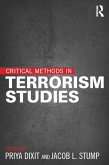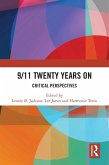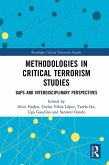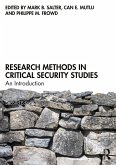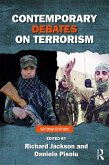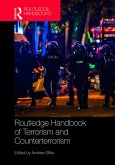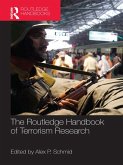46,95 €
46,95 €
inkl. MwSt.
Sofort per Download lieferbar

23 °P sammeln
46,95 €
Als Download kaufen

46,95 €
inkl. MwSt.
Sofort per Download lieferbar

23 °P sammeln
Jetzt verschenken
Alle Infos zum eBook verschenken
46,95 €
inkl. MwSt.
Sofort per Download lieferbar
Alle Infos zum eBook verschenken

23 °P sammeln
- Format: ePub
- Merkliste
- Auf die Merkliste
- Bewerten Bewerten
- Teilen
- Produkt teilen
- Produkterinnerung
- Produkterinnerung

Bitte loggen Sie sich zunächst in Ihr Kundenkonto ein oder registrieren Sie sich bei
bücher.de, um das eBook-Abo tolino select nutzen zu können.
Hier können Sie sich einloggen
Hier können Sie sich einloggen
Sie sind bereits eingeloggt. Klicken Sie auf 2. tolino select Abo, um fortzufahren.

Bitte loggen Sie sich zunächst in Ihr Kundenkonto ein oder registrieren Sie sich bei bücher.de, um das eBook-Abo tolino select nutzen zu können.
This book shows how to use a range of critical methodological approaches to do research on terrorism, including discourse analysis, feminism, postcolonial studies, ethnography, critical theory and visual analysis.
- Geräte: eReader
- mit Kopierschutz
- eBook Hilfe
- Größe: 1.08MB
Andere Kunden interessierten sich auch für
![Critical Methods in Terrorism Studies (eBook, PDF) Critical Methods in Terrorism Studies (eBook, PDF)]() Priya DixitCritical Methods in Terrorism Studies (eBook, PDF)46,95 €
Priya DixitCritical Methods in Terrorism Studies (eBook, PDF)46,95 €![9/11 Twenty Years On (eBook, ePUB) 9/11 Twenty Years On (eBook, ePUB)]() 9/11 Twenty Years On (eBook, ePUB)42,95 €
9/11 Twenty Years On (eBook, ePUB)42,95 €![Methodologies in Critical Terrorism Studies (eBook, ePUB) Methodologies in Critical Terrorism Studies (eBook, ePUB)]() Methodologies in Critical Terrorism Studies (eBook, ePUB)42,95 €
Methodologies in Critical Terrorism Studies (eBook, ePUB)42,95 €![Research Methods in Critical Security Studies (eBook, ePUB) Research Methods in Critical Security Studies (eBook, ePUB)]() Research Methods in Critical Security Studies (eBook, ePUB)35,95 €
Research Methods in Critical Security Studies (eBook, ePUB)35,95 €![Contemporary Debates on Terrorism (eBook, ePUB) Contemporary Debates on Terrorism (eBook, ePUB)]() Contemporary Debates on Terrorism (eBook, ePUB)42,95 €
Contemporary Debates on Terrorism (eBook, ePUB)42,95 €![Routledge Handbook of Terrorism and Counterterrorism (eBook, ePUB) Routledge Handbook of Terrorism and Counterterrorism (eBook, ePUB)]() Routledge Handbook of Terrorism and Counterterrorism (eBook, ePUB)47,95 €
Routledge Handbook of Terrorism and Counterterrorism (eBook, ePUB)47,95 €![The Routledge Handbook of Terrorism Research (eBook, ePUB) The Routledge Handbook of Terrorism Research (eBook, ePUB)]() The Routledge Handbook of Terrorism Research (eBook, ePUB)65,95 €
The Routledge Handbook of Terrorism Research (eBook, ePUB)65,95 €-
-
-
This book shows how to use a range of critical methodological approaches to do research on terrorism, including discourse analysis, feminism, postcolonial studies, ethnography, critical theory and visual analysis.
Dieser Download kann aus rechtlichen Gründen nur mit Rechnungsadresse in A, B, BG, CY, CZ, D, DK, EW, E, FIN, F, GR, HR, H, IRL, I, LT, L, LR, M, NL, PL, P, R, S, SLO, SK ausgeliefert werden.
Produktdetails
- Produktdetails
- Verlag: Taylor & Francis eBooks
- Seitenzahl: 216
- Erscheinungstermin: 26. Juni 2015
- Englisch
- ISBN-13: 9781317692942
- Artikelnr.: 43157503
- Verlag: Taylor & Francis eBooks
- Seitenzahl: 216
- Erscheinungstermin: 26. Juni 2015
- Englisch
- ISBN-13: 9781317692942
- Artikelnr.: 43157503
- Herstellerkennzeichnung Die Herstellerinformationen sind derzeit nicht verfügbar.
Priya Dixit is assistant professor at the Department of Political Science, Virginia Tech, USA.
Jacob L. Stump is assistant professor of political science at Shepherd University, USA.
Jacob L. Stump is assistant professor of political science at Shepherd University, USA.
1. Introduction, Jacob Stump and Priya Dixit 2. Reading Documents in their
Wider Context: Foucauldian and Realist Approaches to Terrorism Discourse,
Jonathan Joseph 3. Applying Marxism to Critical Terrorism Studies: Analysis
Through a Historical Materialist Lens, David Maher and Andrew Thomson 4.
Terrorists as Co-Participants? Outline of a Research Model, Harmonie Toros
5. Ecologizing "Terrorism": Attending to Emergent Pathways of Ethnographic
Fieldwork, Writing and Analysis, Yamuna Sangarasivam 6. Critical Discourse
Analysis, Richard Jackson 7. Metaphor Analysis as a Method in Terrorism
Studies, Alexander Spencer 8. Terrorism: Knowledge, Power, Subjectivity,
Verena Erlenbusch 9. 'Why Does the World Think We Are the Terrorists? We
Are Not the Terrorists!' Using a Reflexive Postcolonial Methodology in the
West Bank of the Palestinian Territories, Caitlin Ryan 10. Marginality as a
Feminist Research Method in Terrorism and Counter-Terrorism Studies,
Katherine Brown 11. Talking about Revolution: Ex-militant Testimony and
Conditions of 'Tell-ability', Charlotte Heath-Kelly 12. Visualizing Others:
A Conversation with Cynthia Weber on Films and Visuality in the "War on
Terror", Cynthia Weber (with Priya Dixit) 13. Falling Bodies: Confronting
the Iconography of Terror, Francois Debrix Conclusion, Priya Dixit and
Jacob Stump
Wider Context: Foucauldian and Realist Approaches to Terrorism Discourse,
Jonathan Joseph 3. Applying Marxism to Critical Terrorism Studies: Analysis
Through a Historical Materialist Lens, David Maher and Andrew Thomson 4.
Terrorists as Co-Participants? Outline of a Research Model, Harmonie Toros
5. Ecologizing "Terrorism": Attending to Emergent Pathways of Ethnographic
Fieldwork, Writing and Analysis, Yamuna Sangarasivam 6. Critical Discourse
Analysis, Richard Jackson 7. Metaphor Analysis as a Method in Terrorism
Studies, Alexander Spencer 8. Terrorism: Knowledge, Power, Subjectivity,
Verena Erlenbusch 9. 'Why Does the World Think We Are the Terrorists? We
Are Not the Terrorists!' Using a Reflexive Postcolonial Methodology in the
West Bank of the Palestinian Territories, Caitlin Ryan 10. Marginality as a
Feminist Research Method in Terrorism and Counter-Terrorism Studies,
Katherine Brown 11. Talking about Revolution: Ex-militant Testimony and
Conditions of 'Tell-ability', Charlotte Heath-Kelly 12. Visualizing Others:
A Conversation with Cynthia Weber on Films and Visuality in the "War on
Terror", Cynthia Weber (with Priya Dixit) 13. Falling Bodies: Confronting
the Iconography of Terror, Francois Debrix Conclusion, Priya Dixit and
Jacob Stump
1. Introduction, Jacob Stump and Priya Dixit 2. Reading Documents in their Wider Context: Foucauldian and Realist Approaches to Terrorism Discourse, Jonathan Joseph 3. Applying Marxism to Critical Terrorism Studies: Analysis Through a Historical Materialist Lens, David Maher and Andrew Thomson 4. Terrorists as Co-Participants? Outline of a Research Model, Harmonie Toros 5. Ecologizing "Terrorism": Attending to Emergent Pathways of Ethnographic Fieldwork, Writing and Analysis, Yamuna Sangarasivam 6. Critical Discourse Analysis, Richard Jackson 7. Metaphor Analysis as a Method in Terrorism Studies, Alexander Spencer 8. Terrorism: Knowledge, Power, Subjectivity, Verena Erlenbusch 9. 'Why Does the World Think We Are the Terrorists? We Are Not the Terrorists!' Using a Reflexive Postcolonial Methodology in the West Bank of the Palestinian Territories, Caitlin Ryan 10. Marginality as a Feminist Research Method in Terrorism and Counter-Terrorism Studies, Katherine Brown 11. Talking about Revolution: Ex-militant Testimony and Conditions of 'Tell-ability', Charlotte Heath-Kelly 12. Visualizing Others: A Conversation with Cynthia Weber on Films and Visuality in the "War on Terror", Cynthia Weber (with Priya Dixit) 13. Falling Bodies: Confronting the Iconography of Terror, Francois Debrix Conclusion, Priya Dixit and Jacob Stump
1. Introduction, Jacob Stump and Priya Dixit 2. Reading Documents in their
Wider Context: Foucauldian and Realist Approaches to Terrorism Discourse,
Jonathan Joseph 3. Applying Marxism to Critical Terrorism Studies: Analysis
Through a Historical Materialist Lens, David Maher and Andrew Thomson 4.
Terrorists as Co-Participants? Outline of a Research Model, Harmonie Toros
5. Ecologizing "Terrorism": Attending to Emergent Pathways of Ethnographic
Fieldwork, Writing and Analysis, Yamuna Sangarasivam 6. Critical Discourse
Analysis, Richard Jackson 7. Metaphor Analysis as a Method in Terrorism
Studies, Alexander Spencer 8. Terrorism: Knowledge, Power, Subjectivity,
Verena Erlenbusch 9. 'Why Does the World Think We Are the Terrorists? We
Are Not the Terrorists!' Using a Reflexive Postcolonial Methodology in the
West Bank of the Palestinian Territories, Caitlin Ryan 10. Marginality as a
Feminist Research Method in Terrorism and Counter-Terrorism Studies,
Katherine Brown 11. Talking about Revolution: Ex-militant Testimony and
Conditions of 'Tell-ability', Charlotte Heath-Kelly 12. Visualizing Others:
A Conversation with Cynthia Weber on Films and Visuality in the "War on
Terror", Cynthia Weber (with Priya Dixit) 13. Falling Bodies: Confronting
the Iconography of Terror, Francois Debrix Conclusion, Priya Dixit and
Jacob Stump
Wider Context: Foucauldian and Realist Approaches to Terrorism Discourse,
Jonathan Joseph 3. Applying Marxism to Critical Terrorism Studies: Analysis
Through a Historical Materialist Lens, David Maher and Andrew Thomson 4.
Terrorists as Co-Participants? Outline of a Research Model, Harmonie Toros
5. Ecologizing "Terrorism": Attending to Emergent Pathways of Ethnographic
Fieldwork, Writing and Analysis, Yamuna Sangarasivam 6. Critical Discourse
Analysis, Richard Jackson 7. Metaphor Analysis as a Method in Terrorism
Studies, Alexander Spencer 8. Terrorism: Knowledge, Power, Subjectivity,
Verena Erlenbusch 9. 'Why Does the World Think We Are the Terrorists? We
Are Not the Terrorists!' Using a Reflexive Postcolonial Methodology in the
West Bank of the Palestinian Territories, Caitlin Ryan 10. Marginality as a
Feminist Research Method in Terrorism and Counter-Terrorism Studies,
Katherine Brown 11. Talking about Revolution: Ex-militant Testimony and
Conditions of 'Tell-ability', Charlotte Heath-Kelly 12. Visualizing Others:
A Conversation with Cynthia Weber on Films and Visuality in the "War on
Terror", Cynthia Weber (with Priya Dixit) 13. Falling Bodies: Confronting
the Iconography of Terror, Francois Debrix Conclusion, Priya Dixit and
Jacob Stump
1. Introduction, Jacob Stump and Priya Dixit 2. Reading Documents in their Wider Context: Foucauldian and Realist Approaches to Terrorism Discourse, Jonathan Joseph 3. Applying Marxism to Critical Terrorism Studies: Analysis Through a Historical Materialist Lens, David Maher and Andrew Thomson 4. Terrorists as Co-Participants? Outline of a Research Model, Harmonie Toros 5. Ecologizing "Terrorism": Attending to Emergent Pathways of Ethnographic Fieldwork, Writing and Analysis, Yamuna Sangarasivam 6. Critical Discourse Analysis, Richard Jackson 7. Metaphor Analysis as a Method in Terrorism Studies, Alexander Spencer 8. Terrorism: Knowledge, Power, Subjectivity, Verena Erlenbusch 9. 'Why Does the World Think We Are the Terrorists? We Are Not the Terrorists!' Using a Reflexive Postcolonial Methodology in the West Bank of the Palestinian Territories, Caitlin Ryan 10. Marginality as a Feminist Research Method in Terrorism and Counter-Terrorism Studies, Katherine Brown 11. Talking about Revolution: Ex-militant Testimony and Conditions of 'Tell-ability', Charlotte Heath-Kelly 12. Visualizing Others: A Conversation with Cynthia Weber on Films and Visuality in the "War on Terror", Cynthia Weber (with Priya Dixit) 13. Falling Bodies: Confronting the Iconography of Terror, Francois Debrix Conclusion, Priya Dixit and Jacob Stump

